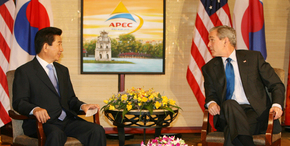 |
|
South Korean President Roh Moo-hyun and U.S. President George W. Bush
|
On sidelines of APEC meeting, two leaders reaffirm commitment to six-party talks
U.S. president George W. Bush and his Chinese counterpart Hu Jintao reached an agreement on the future direction to take regarding the North Korean nuclear problem. The two met at the Asia-Pacific Economic Cooperation (APEC) forum in Hanoi, Vietnam, on November 19. White House spokesperson Tony Snow reported that the direction of the agreement is one with a view toward declaring a formal end to the Korean War, which has been locked in a 53-year stalemate, as well as to spur economic cooperation between China and the U.S. President Hu also seemed to consider this a proper plan, Snow said. In response, The China Daily, China's state-run English newspaper, reported that during the 75-minute summit with President Bush, President Hu expressed his intention to cooperate with all concerned nations, including the United States, so that the six-party talks would resume in an appropriate time, and that order to accomplish the denuclearization of the Korean Peninsula, the two should find a practical solution using wisdom and patience. President Hu in particular stressed he would reconfirm the agreement of the September 19 Joint Statement forged at the six-party talks, which provides a means for cooperation with North Korea alongside a dismantlement of its nuclear program. President Hu explained that the core part of the statement was that North Korea abandons existing nuclear weapons programs and the U.S. declares it has no intention to attack North Korea with conventional weapons or nuclear weapons, according to the newspaper. At the vice-ministerial strategic talks held since August last year, China and the U.S . agreed that as a "responsible concerned party," Beijing would discuss with Washington a "peace regime" on the Korean Peninsula as well as the North's nuclear issue. According to the September 19 statement, the concerned nations will hold negotiations for a lasting peace regime on the Korean Peninsula at a separate, proper forum. At the Hanoi summit, the two leaders reconfirmed this and showed a will that they would reach an agreement within a larger frame, described as a peace regime that would include normalizing relations and scrapping nuclear weapons through the six-nation talks. The U.S. and China are expected to hold working-level consultations this week. U.S. State Department spokesman Sean McCormack was vague about reports that Christopher Hill, top U.S. negotiator for the six-party talks, would visit Beijing this week to meet Chinese vice foreign minister Wu Dawei, saying that he could not deny their verity. Please direct questions or comments to [englishhani@hani.co.kr]





